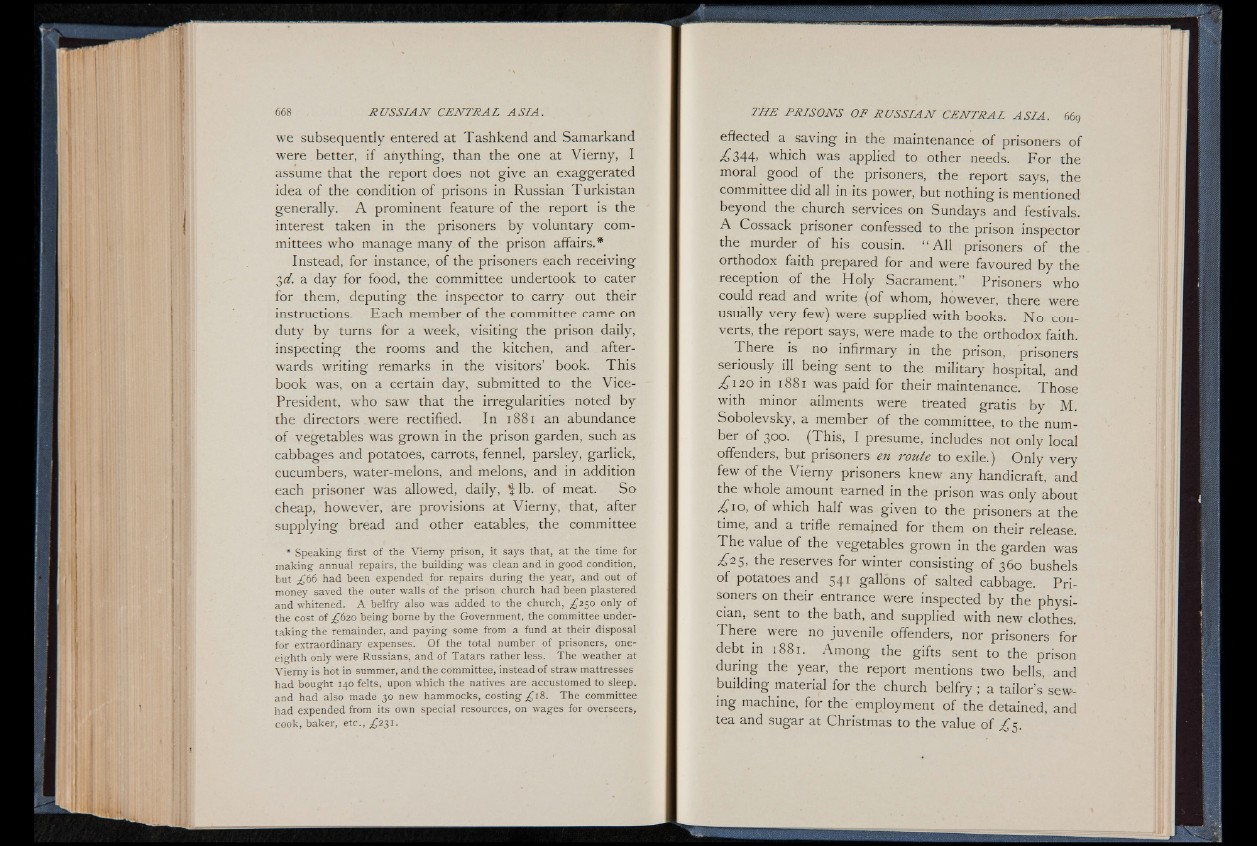
we subsequently entered at Tashkend and Samarkand
were better, if anything, than the one at Vierny, I
assume that the report does not give an exaggerated
idea of the condition of prisons in Russian Turkistan
generally. A prominent feature of the report is the
interest taken in the prisoners by voluntary committees
who manage many, of the prison affairs.*
Instead, for instance, of the prisoners each receiving
2,d. a day for food, the committee undertook to cater
for them, deputing the inspector to carry out their
instructions. Each member of the committee came on
duty by turns for a week, visiting the prison daily,
inspecting the rooms and the kitchen, and afterwards
writing remarks in the visitors’ book. This
book was, on a certain day, submitted to the Vice-
President, who saw that the irregularities noted by
the directors were rectified. In 1881 an abundance
of vegetables was grown in the prison garden, such as
cabbages and potatoes, carrots, fennel, parsley, garlick,
cucumbers, water-melons, and melons, and in addition
each prisoner was allowed, daily, f ib . of meat. So
cheap, however, are provisions at Vierny, that, after
supplying bread and other eatables, the committee
* Speaking first of the Vierny prison, it says that, at the time for
making annual repairs, the building was clean and in good condition,
but £66 had been expended for repairs during the year, and out of
money saved the outer walls of the prison church had been plastered
and whitened. A belfry also was added to the church, ^250 only of
the cost of ^620 being borne by the Government, the committee undertaking
the remainder, and paying some from a fund at their disposal
for extraordinary expenses. Of the total number of prisoners, one-
eighth only were Russians, and of Tatars rather less. The weather at
Vierny is hot in summer, and the committee, instead of straw mattresses
had bought 140 felts, upon which the natives are accustomed to sleep,
and had also made 30 new hammocks, costing £18. The committee
had expended from its own special resources, on wages for overseers,
cook, baker, etc., £231.
effected a saving in the maintenance of prisoners of
^ 344) which was applied to other needs. For the
moral good of the prisoners, the report says, the
committee did all in its power, but nothing is mentioned
beyond the church services on Sundays and festivals.
A Cossack prisoner confessed to the prison inspector
the murder of his cousin. “ All prisoners of the
orthodox faith prepared for and were favoured by the
reception of the Holy Sacrament.” Prisoners who
could read and write (of whom, however, there were
usually very few) were supplied with books. No converts,
the report says, were made to the orthodox faith.
There is no infirmary in the prison, prisoners
seriously ill being sent to the military hospital, and
.£120 in 1881 was paid for their maintenance. Those
with minor ailments were treated gratis by M.
Sobolevsky, a member of the committee, to the number
of 300. (This, I presume, includes not only local
offenders, but prisoners en route to exile.) Only very
few of the Vierny prisoners knew any handicraft, and
the whole amount earned in the prison was only about
£10, of which half was given to the prisoners at the
time, and a trifle remained for them on their release.
The value of the vegetables grown in the garden was
,£25, the reserves for winter consisting of 360 bushels
of potatoes and 541 gallbns of salted cabbage. Prisoners
on their entrance were inspected by the physician,
sent to the bath, and supplied with new clothes.
There were no juvenile offenders, nor prisoners for
debt in 1881. Among the gifts sent to the prison
during the year, the report mentions two bells, and
building material for the church belfry ; a tailor’s sewing
machine, for the employment of the detained, and
tea and sugar at Christmas to the value of ¿ 5 .